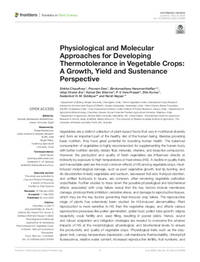Physiological and Molecular Approaches for Developing Thermotolerance in Vegetable Crops: A Growth, Yield and Sustenance Perspective

Authors:
Vegetables are a distinct collection of plant-based foods that vary in nutritional diversity and form an important part of the healthy diet of the human being. Besides providing basic nutrition, they have great potential for boosting human health. The balanced consumption of vegetables is highly recommended for supplementing the human body with better nutrition density, dietary fiber, minerals, vitamins, and bioactive compounds. However, the production and quality of fresh vegetables are influenced directly or indirectly by exposure to high temperatures or heat stress (HS). A decline in quality traits and harvestable yield are the most common effects of HS among vegetable crops. Heat-induced morphological damage, such as poor vegetative growth, leaf tip burning, and rib discoloration in leafy vegetables and sunburn, decreased fruit size, fruit/pod abortion, and unfilled fruit/pods in beans, are common, often rendering vegetable cultivation unprofitable. Further studies to trace down the possible physiological and biochemical effects associated with crop failure reveal that the key factors include membrane damage, photosynthetic inhibition, oxidative stress, and damage to reproductive tissues, which may be the key factors governing heat-induced crop failure. The reproductive stage of plants has extensively been studied for HS-induced abnormalities. Plant reproduction is more sensitive to HS than the vegetative stages, and affects various reproductive processes like pollen germination, pollen load, pollen tube growth, stigma receptivity, ovule fertility and, seed filling, resulting in poorer yields. Hence, sound and robust adaptation and mitigation strategies are needed to overcome the adverse impacts of HS at the morphological, physiological, and biochemical levels to ensure the productivity and quality of vegetable crops. Physiological traits such as the stay-green trait, canopy temperature depression, cell membrane thermostability, chlorophyll fluorescence, relative water content, increased reproductive fertility, fruit numbers, and fruit size are important for developing better yielding heat-tolerant varieties/cultivars. Moreover, various molecular approaches such as omics, molecular breeding, and transgenics, have been proved to be useful in enhancing/incorporating tolerance and can be potential tools for developing heat-tolerant varieties/cultivars. Further, these approaches will provide insights into the physiological and molecular mechanisms that govern thermotolerance and pave the way for engineering “designer” vegetable crops for better health and nutritional security. Besides these approaches, agronomic methods are also important for adaptation, escape and mitigation of HS protect and improve yields.
